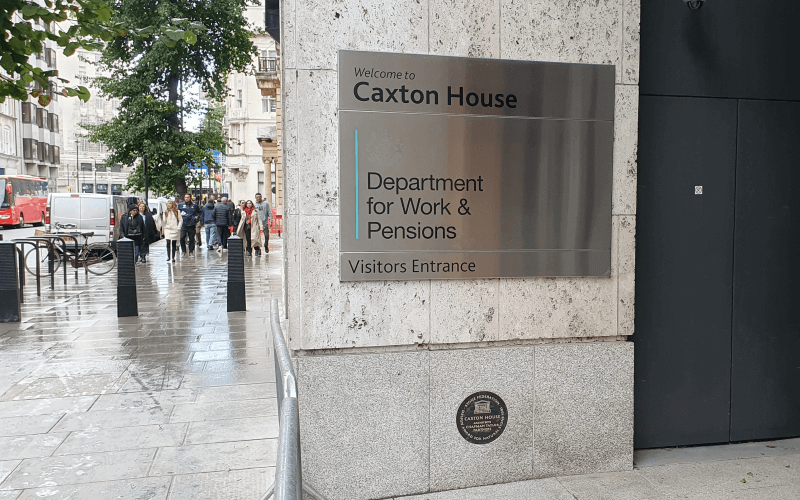The Department for Work and Pensions (DWP) has secretly weakened its own rules on when it should investigate the deaths of benefit claimants who take their own lives.
Four years ago, the department told the National Audit Office (NAO) that it would always carry out one of its secret reviews when it heard of a claimant’s death if they had died by suicide, even if there were no allegations that DWP’s actions had contributed to that death.
Since then, it has repeatedly insisted that it has “established procedures to investigate and learn lessons” in the “minority” of cases where deaths occur, but Disability News Service (DNS) has now established that it weakened its guidance a year after its pledge to NAO.
New figures obtained by DNS through a freedom of information (FoI) request show that on at least four occasions in 2022-23, the department failed to investigate when told of the suicide of a claimant.
When asked by DNS why these four suicides had not led to an investigation, a DWP spokesperson said the criteria was changed in April 2021, a year after it informed NAO that all suicides of claimants it heard about should lead to an internal process review (IPR) “regardless of whether there are allegations of Department activity contributing to the claimant’s suicide”.
It said the change in 2021 allowed the department to focus on cases where a claimant had died or suffered serious harm where there was also an allegation that DWP’s actions – according to a previous FoI request – “may have negatively contributed to the customer’s circumstances”.
Over the last 15 years, investigations by disabled people’s grassroots groups, journalists, academics and other organisations and campaigners have linked systemic DWP failings with hundreds, and probably thousands, of suicides of claimants.
But this week’s admission suggests that DWP has taken a significant backward step in addressing the serious and continuing risk to the lives of disabled people, particularly those who pass through its disability assessment systems.
And it comes as the Commons work and pensions committee continues an inquiry into “safeguarding vulnerable claimants” (see separate stories).
The FoI request had followed concerns raised last month by Labour’s Debbie Abrahams at a meeting of the committee, when she questioned DWP’s most senior civil servant on figures that showed how 29 requests to carry out an IPR in 2022-23 had been rejected by the department’s IPR team.
All those referrals are believed to have come from DWP civil servants.
Abrahams told Peter Schofield, DWP’s permanent secretary, that the figures suggested his department might not be “really looking at the full scale and issues of the potential harms that are happening”.
IPRs are supposed to “help inform improvement” of DWP’s “capability, culture, behaviour and processes” through an “internal, high quality, investigation that shows where the customer experience has fallen short of expected standards”, and to set out how the department can “minimise future risks”.
Following last month’s committee meeting, DNS submitted a request to DWP’s freedom of information team, asking for details of the 29 IPR referrals that had been rejected.
DWP has now revealed that of those 29 referrals, 18 related to a claimant who had died, and of those 18 deaths, four were believed to be suicides.
Of the 29 referrals, three of the claimants had been receiving disability living allowance, seven had been receiving employment and support allowance, 10 had been receiving personal independence payment, and 15 had been receiving universal credit*.
Of the 15 referrals where a claimant had been receiving universal credit, 11 related to a death, and one had been recorded as a suicide.
Abrahams said: “These latest data provide further evidence of the deep failures in DWP safeguarding.
“That these cases did not lead to IPRs after the government’s commitment that all suicides would be investigated following the 2020 NAO report into DWP claimant suicides is shocking.
“It also demonstrates that the department’s official figures about the deaths of social security claimants are just the tip of the iceberg.
“I’m hopeful that the select committee’s safeguarding inquiry will be a start to addressing the wholly inadequate approach to safeguarding in the government’s Department for Work and Pensions.”
A DWP spokesperson said in a statement: “Anyone taking their own life is tragic and the reasons for this can be very complex.
“The responsibility for determining a person’s cause of death rightfully sits with a doctor or HM Coroner – and DWP has an established channel for coroners to liaise with the department if required.”
*Some claimants will have been receiving more than one benefit
A note from the editor:
Please consider making a voluntary financial contribution to support the work of DNS and allow it to continue producing independent, carefully-researched news stories that focus on the lives and rights of disabled people and their user-led organisations.
Please do not contribute if you cannot afford to do so, and please note that DNS is not a charity. It is run and owned by disabled journalist John Pring and has been from its launch in April 2009.
Thank you for anything you can do to support the work of DNS…

 Minister finally admits that working-age benefits spending is stable, despite months of ‘spiralling’ claims
Minister finally admits that working-age benefits spending is stable, despite months of ‘spiralling’ claims Timms says cuts must go ahead, despite being reminded of risk that disabled claimants could die
Timms says cuts must go ahead, despite being reminded of risk that disabled claimants could die Timms misleads MPs on DWP transparency and cover-ups, as he gives evidence on PIP review
Timms misleads MPs on DWP transparency and cover-ups, as he gives evidence on PIP review